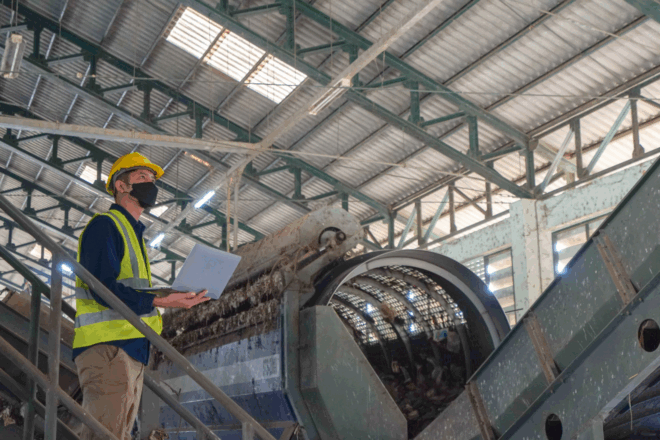Waste Management and Performance Audits: A Framework for Sustainable Infrastructure

Author: Sherlita Nurosidah (SAI Indonesia)
Waste, often regarded as the byproduct of industrialization and urbanization, has become one of the most critical global issues, with municipal waste generated worldwide exceeding two billion tons each year. This number will continue to rise due to increased human activity throughout the entire lifecycle of non-municipal waste as well, including that from agriculture, construction, industry, and healthcare.
Waste management continues to pose challenges as the intricacies of social, economic, and environmental impacts become more complex in terms of variability and composition. Since the 1992 Rio Declaration, municipal waste has garnered global attention with the issuance of the Polluter Pays Principle and has become one of the priorities of Agenda 21, which encourages sound management. Referring to the United Nations Sustainable Development Goals (SDGs), waste management is seen as essential in fostering the development of infrastructure, education, technology, creativity, and employment opportunities, thus creating efficiency and reducing financial risks, as outlined by the United Nations Development Program (2024). A summary of the aforementioned relationship can be accessed through https://bpk.id/appendix-waste-management.
In 2006, led by the Ministry of Public Works, Indonesia began developing a waste management system as part of the National Policy and Strategy to promote a healthier living environment. Following this initiative, the government issued Law Number 18 of 2008 on waste management and Government Regulation Number 81 of 2012 on the management of municipal waste and waste-like materials. A report in 2016 showed that the presence of more defined infrastructure would support the government in achieving their goal more quickly, such as through the use of sanitary landfills over open dumping, the more widespread initiation of waste banks, incentivizing producers who effectively manage extended responsibility, and the utilization of waste-to-energy facilities. Over the years, Indonesia has firmly believed that a waste-free state can be achieved by continuing to include waste management in the National Plan, which is renewed every five years to this day.
In 2024, as recorded by the information system of national waste management at the Ministry of Environment, Indonesia achieved 59.75% on well managed waste.
Audit Objectives
A SAI’s capacity is undoubtedly demonstrated in guarding national progress through its performance audits, especially in the case of waste management. This also applies to SAI Indonesia over the past decade. As a continuous lifelong externality borne by all of society, waste management is a challenge that all stakeholders, including SAI communities, are working to address. Table 1 elaborates further on the emphasis of SAI Indonesia’s audit objectives as referred from the performance audit reports on waste management compared to the one published by the INTOSAI Working Group on Environmental Audit (WGEA) in 2003, entitled “Towards Auditing Waste Management”.
Table 1. Comparison of Audit Objectives between INTOSAI WGEA and SAI Indonesia
| Audit Objectives | INTOSAI WGEA | SAI Indonesia |
|---|---|---|
| The existence of waste policy | Covering all stages of the waste stream and ensuring policy consistency with the general environmental policy. | Establishing adequate policies and strategies for waste management by the local government. |
| Compliance with national environmental policy | Reflecting waste management policies in legislation and regulations. | Reflecting the national waste management strategy and master plan in the local government’s regulation. |
| Risk Management | Managing risks sufficiently. | Planning for resource needs (budget, human resources, facilities, and infrastructure) at all stages of waste management. |
| Quality of the implementation process | Implementing policies effectively and conducting environmental impact assessments. | Effectively managing waste and ensuring facilities meet required standards. |
| Performance of the waste management system | Delegating responsibilities to appropriate bodies and ensuring efficient use of necessary instruments. | Implementing adequate waste segregation, collection, transportation, reduction, final processing, and waste fee management, while ensuring proper landfill provisions and end-of-waste processing. |
| Compliance with national laws and regulations | Complying with national rules and procedures by the relevant actors. | Appointing the right personnel as outlined in national regulations. |
| Compliance with international obligations | Ensuring policies, legislation, and practices comply with international obligations and agreements. | Adhering to international standards. |
| Monitoring | Establishing and ensuring the efficiency of necessary monitoring systems. | Overseeing monitoring and evaluation of waste handling activities. |
| Effects of other government activities | Managing all government activities in accordance with waste management legislation and regulations. | n/a |
| Effective Communication to people’s participation | n/a | Conducting communication, education, and information strategies, facilitating community-based recycling, and promoting innovations in reuse. |
As illustrated in the table, SAI Indonesia’s performance audit on waste management has generally followed the guidance issued by the INTOSAI WGEA. SAI Indonesia emphasizes the infrastructural aspects of waste management, prioritizing them while maintaining relevant policies and personnel. Raising awareness in the country remains an ongoing concern, making it paramount to evaluate the waste management process, including infrastructural facilities related to waste segregation, collection, transportation, and processing.
SAI Indonesia’s uniqueness in their audit on waste management’s objectives is on the necessity of fostering effective communication by providing the right infrastructure to elevate people’s participation. Indonesia, a vast and multicultural nation with over 17,000 islands and hundreds of distinct ethnic groups, faces unique challenges in ensuring efficient collaboration across regions, each with its own local characteristics and governance structures. An emphasize has to be put in strengthening coordination across diverse villages to overcoming environmental challenges and ensuring sustainable practices.
While national contexts vary and there is no one-size-fits-all solution that can be used to move towards zero waste and a circular economy, it is clear that the hidden costs of waste are unaffordable for current and future generations. It is important to note that for waste management systems to be effective and efficient, behavioural change of households is strongly required. Commitment by households, citizen awareness and participation offer the difference for managing waste in a multicultural country. Research shows that waste management is 20 percent about technology and 80 percent about people (United Nations Development Program, 2024). Successful waste management underlines the influence of stakeholder participation, social support and a strong social contract with citizens.
From the performance audit, it can be gathered that local government’s strong encouragement towards community-based infrastructural development is beneficial to strengthening citizen participation. Infrastructures are monitored from planning to segregating, collecting, and processing the waste. It eases the process as localities have the sense of ownership making socialization and education becomes more approachable. Special attention also placed to incentivization mechanism to all stakeholders allowing them to reflect on the consequences of their deeds. Greener public spaces are also exuded by the local government as per request. Personnel rotation is operationalized to waste collection plan acting as per one to four times a day or once, two, to three times per week depending on the location connectivity. It is also possible to have a door-to-door collection system when certain areas do not have any available landfill nearby.
In the future, addressing spatial overlap between local governments will be a key area for improvement in Indonesia’s performance audits of waste management, as guided by the INTOSAI WGEA. SAI Indonesia’s current attention to clear and open communication channels will be beneficial for resolving these overlaps and navigating the complexities arising from the country’s diverse social and administrative landscape. This approach will promote the equitable distribution of resources and services, leading to more efficient and sustainable waste management solutions.
About the Author
Sherlita Nurosidah has been with SAI Indonesia for over seven years, handling responsibilities that cover finance, auditing, and international cooperation. She has actively contributed to academic journals and conference papers on a wide range of topics, including accounting, public auditing, economic issues, flypaper effects, sustainable energy, SAI independence, sustainable agriculture and food security, and legal studies.





